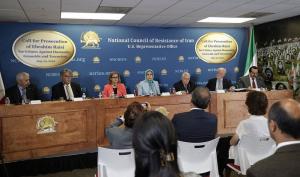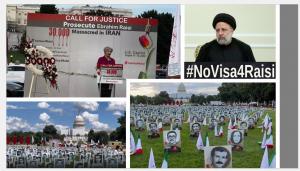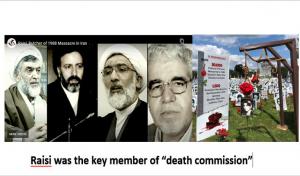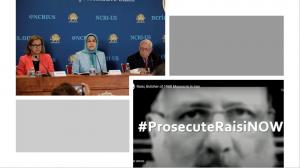(Video) A Complaint Filed Against Iran’s Regime President Ebrahim Raisi in New York

On, August 25, at a press conference in Washington D.C., the National Council of Resistance of Iran (NCRI) announced its firm resolve to hold Ebrahim Raisi, the mullah's President, to account for crimes against humanity and genocide in 1988 inside Iran.

In light of Ebrahim Raisi‘s scheduled trip to the United States to attend and address the U.N. General Assembly in September 2022, lawyers representing the NCRI and a group of victims of atrocities committed by Raisi have filed a complaint against him.

The plaintiffs are all supporters of the People’s Mojahedin Organization of Iran (PMOI / MEK) and the National Council of Resistance of Iran. They are former political prisoners, survivors of the 1988 massacre, and families of MEK martyrs.
Witnesses have sad stories to tell, and this lawsuit will allow them to tell those stories in a court of law. Two U.S. statutes are the bases for the action.
In light of Ebrahim Raisi‘s scheduled trip to the United States to attend and address the U.N. General Assembly in September 2022, lawyers representing the NCRI and a group of victims of atrocities committed by Raisi have filed a complaint against him in the U.S. District Court for the Southern District of New York.
The plaintiffs are all supporters of the People’s Mojahedin Organization of Iran (PMOI / MEK) and the National Council of Resistance of Iran. They are former political prisoners, survivors of the 1988 massacre, and families of MEK martyrs. More plaintiffs are inspected to join the complaint in the coming days.
Former United States Attorney General Michael Mukasey and Mr. Steven M. Schneebaum, Counsel for Plaintiffs, also joined the press conference to share professional insight on the lawsuit and the legal mechanism of the U.S. judicial system’s jurisdiction to try Ebrahim Raisi for his crimes.
At the conference, NCRI representative in Washington DC, Ms. Soona Samsami, stated: “the Iranian regime’s President, Ebrahim Raisi, is planning to visit the U.N. and address the United Nations General Assembly in September. It is our contention and many others that instead of hosting Raisi, the U.N. must hold him accountable for crimes against humanity and genocide.
Anything less would be an affront to the very principles and values that constitute the foundation and the charter of the U.N.”
“Ebrahim Raisi, the current Iranian regime’s President, was a member of the Death Commission in Tehran and was therefore personally responsible for sending thousands of MEK prisoners to the gallows in Tehran and the city of Karaj, west of the capital.
As the Judiciary Chief, he personally oversaw the murder of at least 1,500 protesters crying for freedom during the November 2019 uprising.”
“His record since last year once again proves his criminality. 582 executions, including 22 women and eight juvenile offenders since August 2021 when he took office show an almost 100 percent increase in executions compared to the previous year.”
“It is time to hold Ebrahim Raisi and other senior officials of the regime, including Ali Khamenei, the supreme leader, accountable for their crimes against humanity and genocide.”
81st Attorney General of the United States, Judge Michael B. Mukasey, said at the conference: “In 2019, the U.S. Treasury Department’s Office of Foreign Assets Control, known as OFAC, imposed sanctions on Ebrahim Raisi based on his participation in what has become known as the ‘Death Commission’, ordering the execution of thousands of political prisoners including thousands of members of MEK, in 1988.
In 2021 the U.S. State Department imposed immigration restrictions on him based on a finding that he was a senior Iranian official involved in the commission of serious human rights abuses.”
“It is anticipated that if Raisi comes to the United States, as he has said he will in September to attend the U.N. General Assembly, he would be subject to the jurisdiction of United States courts and could be served with the complaint in this case, which presents claims under two federal laws the Torture Victim Protection Act and the Alien Tort Statute.
These laws are similar in that they allow for the filing of civil rather than criminal claims in U.S. courts – claims that allow plaintiffs to affix civil liability on individuals who act in an official capacity, for any foreign nation, to commit torture or extrajudicial killing of victims of any nationality, including victims who are of the same nationality as the perpetrators.”
“Raisi has been sued as an individual, but the acts he committed were committed in his official capacity as someone exercising powers given him by the government of Iran indeed, powers he exercised in carrying out a 1988 fatwa by the ayatollah Khomeini himself.
Although these acts were committed abroad, in the exercise of official powers, there should be little doubt that such acts come within reach of the statutes cited in this complaint. It is the United States Congress that has explicitly granted to federal courts in the United States the jurisdiction to hear such actions and to grant the civil relief they provide for.”
“Raisi has not denied his participation and in 2018 was quoted as saying that the murders committed at the direction of the death commissions were “one of the proud achievements of the system.”
“If Raisi claims diplomatic status, he asserts diplomatic immunity from being sued. The United States is a party to the 1961 Vienna convention on diplomatic relations. Because the United States is a party to it, that convention is a treaty and has the force of law in this country.
“However, it should be stressed that it is far from clear that Raisi is eligible for the status of a diplomat. The convention itself defines a diplomat as the head of a diplomatic mission or a member of the mission.
Raisi is certainly not the head of Iran’s mission to the U.N., and, so far as we know, is not designated as a member of the mission. Also, the special treaty-based immunity of representatives of U.N. member states from civil suits is limited to acts done by them in their capacity as representatives. That is not what we have here.”
“The U.S. State Department should consider that according to a complaint filed by the justice department, it was in October 2021 two months after Raisi took office that the Iranian government solicited.
people to murder former National Security Advisor John Bolton and former Secretary of State Mike Pompeo, and perhaps a third official, apparently in retaliation for the attack in January 2020 that killed Qassemi Soleimani, former head of Iran’s IRGC Quds Force, an agency designated as a terrorist organization by the United States. That murder was to be carried out on U.S. soil.
Based on the structure of the Iranian government, that plot likely would have had the approval of Raisi as Chair of the Supreme National Security Council, one of two bodies involved with authorizing foreign terrorist operations, the other being the special affairs office of the supreme leader Ali Khamenei.”
Mr. Steven M. Schneebaum, P.C., Counsel for the Plaintiffs, stated: “In 1988, as many as 30,000 individuals, guilty of nothing but principled resistance to the mullahs’ oppression, were hanged at Evin and Gohardasht Prisons in Tehran that summer.
I say that these facts are beyond doubt because they are: the massacre has been reported on and denounced by Amnesty International, by various agencies of the United Nations, and by our own Department of State.”
“The Death Commission was no court, of course: there were no lawyers present, and no defense and no appeal was permitted. It was constituted for the sole purpose of providing legal cover for a planned mass murder.
It is also beyond doubt that in his capacity as Deputy State Prosecutor for Tehran Province, Ebrahim Raisi was a member of the Death Commission. This, too, has been amply and widely documented.
He has on his hands the blood of those who were killed, as well as of those who somehow escaped death, only to be tortured. And he has never been held accountable for his involvement in that massacre.”
“The plaintiffs, in this case, are survivors of the massacre and family members of some of the men and women who were murdered. They are now citizens of the United States, Canada, the United Kingdom, Germany, and Switzerland.
They have harrowing stories to tell, and this lawsuit will allow them to tell those stories in a court of law. Two U.S. statutes are the bases for the action.
One of them dates from the earliest days of the Republic (in fact, it was signed into law by President George Washington in September of 1789).
The Alien Tort Statute empowers federal courts to hear cases alleging injuries done to foreign citizens in violation of the law of nations. The second basis is of somewhat more recent vintage.
The Torture Victim Protection Act of 1991 opens the courthouse doors to U.S. citizens who were, or whose loved ones were, tortured or illegally executed under color of foreign law.”
“Raisi will be personally served with the process when he arrives in New York City in September to attend the 77th session of the United Nations General Assembly.
Once he is served, he will have 21 calendar days to respond to the complaint. If he fails to do so, the plaintiffs will seek a default judgment enforceable against Raisi or his assets.
The Judge assigned to the case has scheduled a preliminary hearing for November 15. It is likely that Raisi, or someone acting on his behalf, will contend that he cannot be sued in the United States because he is entitled to immunity: either diplomatic immunity or personal immunity as a sitting head of state. But neither proposition is correct.
Raisi is not a diplomat and is not eligible for the privileges extended under the Vienna Convention. Nor is he, in fact, a head of state. Although he carries the title of President, it is the Supreme Leader who is the head of state of the Islamic Republic, as the country’s own Constitution makes clear.”
“Whether or not it ultimately proceeds to trial, through the filing of this case, the plaintiffs have already won some measure of vindication. They have invoked the rule of law, and they have invited their tormentor to respond to their charges in a court of law.”
“For a crime of this magnitude, there has to this date been no justice. This lawsuit in the United States, brought by these plaintiffs against this defendant, to be heard by a federal judge, is a small step toward that goal. My clients hope that it will be some solace to others around the world who were, or whose loved ones were, victims of the regime’s lawlessness, crimes against humanity, and terrorism, to know that, here in America, the rule of law is still alive and well, and that no one, no matter his title, stands above it.”
As one of the plaintiffs, Ahmad Hassani, a supporter of the MEK who lives in Canada, said: “My brother Mahmoud who was born in Iran in 1960, was a student at Tehran University when he was arrested in 1981, at the age of 21, and was sentenced to 10 years in prison for expressing support for the main Iranian opposition group, the Mujahedin-e Khalq (MEK).”
“Raisi is directly and personally responsible for the execution of my brother because he was a member of the death commission in Tehran, which ordered the execution of political prisoners in Evin Prison and Gohardasht Prison in Karaj, west of the capital.”
Sheila Neinavaie, another MEK supporter from San Francisco (C.A.), said: “I was arrested three times and spent a total of 8 years in various Iranian prisons.
I was first arrested in November 1981 by the Iranian regime security forces when I was barely 15 years old at my home in Tehran and taken to the notorious Evin prison simply for distributing the literature of the main Iranian opposition movement, the MEK.
After months of torture with no due process, I was sentenced to 5 years of imprisonment in a trial that lasted less than 3 minutes.”
“I was among the very few survivors. After months of returning to my solitary confinement, I realized that most of the people I knew in prison had been hanged, and the prison, which was full when I entered it, seemed deserted and empty.”
“Now, every time I hear the name of Ebrahim Raisi, I totally forget about myself and remember the pregnant women who I saw being beaten when children as young as two years old running around and looking for their mother or crying because they were hungry. I remember the innocent faces of young girls who never made it out of prison.”
“For this reason, I chose to join the legal complaint as a witness and victim of Raisi’s crimes against humanity and genocide. Now is the time for justice and accountability.”
Shahin Gobadi
NCRI
+33 6 61 65 32 31
email us here
During that massacre, 30,000 political prisoners, primarily affiliated with the MEK, were summarily executed within a few months.
Legal Disclaimer:
EIN Presswire provides this news content "as is" without warranty of any kind. We do not accept any responsibility or liability for the accuracy, content, images, videos, licenses, completeness, legality, or reliability of the information contained in this article. If you have any complaints or copyright issues related to this article, kindly contact the author above.


